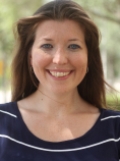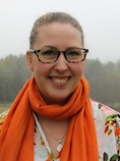|

Anastasia Khawaja
University of South Florida, Tampa, Florida, USA
|
|

Riah Werner
National Pedagogical Institute for Technical and Professional Training, Abidjan, Cote d’Ivoire
|
Dear SRIS,
When we decided allyship would be the theme for our fall newsletter, we did not think the process of putting this issue together would take this long. The reason we chose this topic is, yes, mainly due to the current political climate in the US and globally. However, we did not take in to account, nor could we of course predict, the numerous breaking news events that would take place between the publication of our last issue and now. Everytime the issue was almost ready, something else happened that we felt needed to be included. In addition to the responsibility we felt to be as inclusive as possible, there was also the need for self care for us as individuals as we watched in horror as many of these stories have unfolded in the recent months, looked on with hope as the results of the 2018 midterm election results were announced, and put our head in our hands as we witnessed the clock tick down to another government shutdown right before Christmas and the New Year which as we write this is still in progress.
This particular issue is one we are very proud to bring you. It is our wish that you will find encouragement, solidarity, and calls to action expressed in these carefully written pieces from yet another group of incredible activists, scholars, and educators from our membership. As always our authors’ perspectives are their own, and our newsletter should be taken as a forum for our membership to share their views about issues that are important to them, which may or may not reflect the opinions or official positions of TESOL International Association.
This issue begins with Speaking Up and Pushing Back: Women of Color in the Academy a recap of a panel held at the 2018 TESOL convention by the Sister Scholars, a collective of seven scholars who’ve spent the last fifteen years bringing attention to the position of women of color within TESOL, who once again draw on their own experiences to highlight the ways we can support ourselves and our sisters as we navigate academia. Next, in De-Centering Whiteness in TESOL, Scott Stillar calls for us to shift our ideological framework to address issues of systemic racism that pervade our society in and out of the classroom. Continuing the exploration of the issues of race and the role of White TESOLers as allies, Anastasia Khawaja and Liana Smith reflect on their position as White American women leading TESOL’s Palestinian Educators and Friends Professional Learning Network in Collaboration Under Occupation: Allyship for Palestine.
Next is an article that highlights the role teachers can play as allies within their own communities, Catherine James Njau explains how she addresses menstrual hygiene and breaks taboos using drama in Keep Them Flying: Reusable Menstrual Pads and Girls Education in Tanzania. In Out with the Textbook, In with the Computer: Empowering Immigrant University Employees in the ESL Classroom, Lisana Mohamed gives us another first person perspective as she outlines how and why she created an English course for custodial workers at her institution.
We end the newsletter with two pieces addressing the needs and experiences of nonbinary and transgender students in English classes. First, in Transgender University Experience in Mexico, David Ruiz Guzmán shares the perspectives of two openly transgender students he taught in a conservative area, steeped in the culture of machismo. Then, in Beyond He/She: The Power of Language in Making ESOL Environments Inclusive for Trans and and Non-Binary Students and Colleagues, Gabriel Winer calls for the incorporation of singular they in ESOL classrooms and materials and outlines other practical strategies for affirming the gender identities of our students and colleagues through our professional practices.
Collectively, these articles showcase a range of ways we can be allies and advocates for ourselves, our colleagues, our students and our communities. We hope that you’ve been inspired to speak up and stand up for a more just society, starting in your classroom and continuing into the world. For further insight into the diverse ways SRIS members are engaging as allies, we encourage you to check out the SRIS panels at the 2019 TESOL Convention in Atlanta, Georgia. Our academic session, From Talk to Action: Putting Social Responsibility into Practice, will highlight the tensions and strategies our members have for taking concrete steps to address social injustices. In addition, we have intersection panels with PAIS, MWIS, EFLIS and B-MEIS. Our chair, Carter Winkle, has also collaborated with members of PLNs representing marginalized groups within TESOL to create Voices From Within the Margins of TESOL: An Ethnodramatic Performance. This artistic exploration has inspired the theme for our post-convention newsletter, on Social Justice and the Arts. We also encourage all of you to attend our open meeting, which will be held from 5:00 pm to 6:30 pm on Wednesday, March 13th in the Walnut room, and streamed live on our Facebook page for those who cannot attend in person. It’s always so inspiring to be in the same room as our members, and we look forward to keeping the energy going as we transition from being newsletter editors to your new co-chairs.
Sincerely,
Anastasia and Riah
Anastasia Khawaja has been in the TESOL teaching profession for 12 years. She is a doctoral candidate in second language acquisition/instructional technology at the University of South Florida. Her dissertation research focuses on the emotions associated with languages that Palestinians use in Palestine and in the diaspora. She currently holds the position of senior instructor at INTO University of South Florida and has international teaching experience in Peru, South Korea, and the United Arab Emirates.
Riah Werner is an English teacher and teacher trainer who has taught in Africa, Asia and South America. She is currently an English Language Fellow based in Abidjan, Cote d’Ivoire, where she has designed a national continuing professional development project for in-service teachers. Her research interests include drama and the arts, social justice in ELT, and locally contextualized pedagogy. She documents her projects and blogs about the articles she reads at riahwerner.com. |

